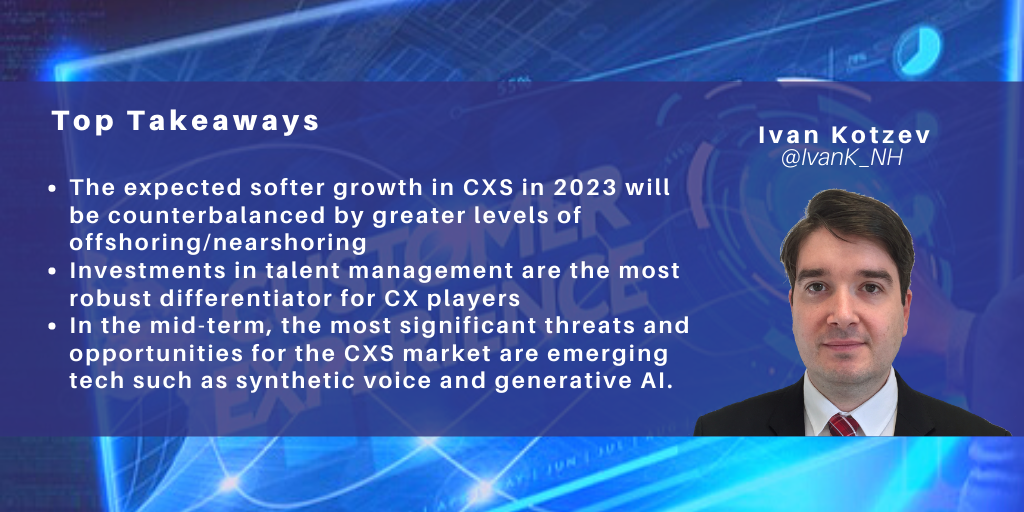posted on Dec 21, 2022 by Ivan Kotzev

As we end a relatively successful and dynamic 2022 for CX services, here’s a look at some developments we expect in the new year.
CX services market is slowing down
The CX services market had a strong CY 2022, with most top 10 players registering high single-digit organic growth in Q3. The macroeconomic headwinds already started to impact the second half of 2022, with increased client caution lowering demand in the largest CX services verticals of telecom, banking, and retail. Some previously high-growth sub-segments, such as crypto, are being impacted particularly severely. However, certain client industries are bucking the trend, notably in travel, mobility, gaming and entertainment, often driven by a return to pre-pandemic levels, changing consumer habits, and new support LOBs. Vendors prioritizing these segments could offset some of the decline in other client sectors.
Nearshore and offshore capacity to accelerate growth
The second half of 2022 showed some signs of rapidly rising labor costs beginning to stabilize. However, in 2023, authorities from the U.S. to Indonesia and Eastern Europe are planning minimum wage hikes. As other expenses rise (e.g., energy), costs and their predictability are a key priority for outsourcing clients. These costs are coupled with limited talent availability and digital skill shortages, resulting in brands looking for more CX capacity nearshore and offshore.
In 2023, new center openings and acquisition activity in nearshore/offshore countries will be even greater than in 2021 and 2022, with geographies such as South Africa, Egypt, Turkey, and Colombia continuing as direct beneficiaries of this demand. East and West African countries are already experiencing meaningful CX outsourcing interest for the first time, with companies such as Majorel and CCI building capacity in these regions.
All this demand is topped by the prevailing market need for truly global support, which requires CXS players to offer resources for at least North America, Western Europe, and core APAC countries. In 2022, some of these moves included:
- U.S.-headquartered vendors acquiring in Europe (e.g., TaskUs in Croatia, ResultCX in Bulgaria)
- European-headquartered vendors building nearshore U.S. capacity in LATAM (e.g., Webhelp in Mexico, Intelcia in Jamaica)
- APAC-headquartered vendors building capacity in Europe (e.g., TDCX in Turkey).
As vendors and clients embrace this multishore delivery model, the more advanced market players are incorporating a strong gig/freelance element for added flexibility and cost controls. Gig work strategies include:
- Partnerships and in-house platforms (e.g., Alorica, Concentrix, TaskUs, WNS)
- Outright acquisitions (e.g., Movate, Tech Mahindra, TELUS International).
Talent management is the best inoculation strategy for CX players
CX players are among the leaders in talent sourcing, learning and development, and agent augmentation. To retain these capabilities in 2023, their investments in the space need to continue across a broad range of capabilities: virtual employee recruitment, onboarding, training, employee health and well-being, upskilling, gamification, immersive learning in the Metaverse, machine translation, and real-time sentiment analytics. The growing importance of ESG for talent attraction (for example, impact sourcing and green policies) will receive more boardroom attention.
CXS vendors’ 2022 acquisition activity shows an emerging appetite to boost their HR tech and talent management capabilities; examples include:
- Teleperformance buying recruitment services provider PSG for $300m
- HGS planning to acquire Human Resources Management System company uKnowva.
External factors to disrupt CX players
Multiple external threats and disruptions impacted the CX services market in 2022. The war in Ukraine, cybersecurity breaches, supply chain breakdowns, health risks, political instability, and environmental emergencies all affected the industry, highlighting the role of risk diversification.
Next year, many of these risks will remain, with China as a domestic and offshore destination likely to be the most immediate worry for CXS executives.
Somewhat under the radar, however, are the inching regulatory changes such as the EU’s Digital Services Act (DAS) and Digital Markets Act, the U.K. Online Safety bill, and similar regulations in Australia and the U.S.
The issue of digital sovereignty will potentially place new rules on social media, digital delivery, and server locations, with the EU likely to set the standard for many other countries to follow. For the multinational CX services providers with an onshore presence in key geographies, the new digital regulatory environment could be a boost.
Long-term challenge: breaking the linear relationship between business growth and workforce increase
CX services will remain a “people business” in 2023 and 2024, but with changing CX technology, enterprise industries, and end-user preferences evolving, CXS players cannot rely on process optimizations and operational excellence. Most of the CX challenges are organizational and ecosystem-related, requiring advanced consulting and technology solutions to break the linear dependence between revenue and employee number increases.
On the consulting, experience design, and brand support side, the CXS vendors already making massive moves, among others, are:
- Concentrix Catalyst unifying the PK and Tigerspike divisions
- TELUS International planning to acquire WillowTree
- Majorel merging its consulting, technology, and content services in Majorel X.
In parallel, the leading vendors are creating a network of technology partners to offer domain-specific digital assets in automation and analytics.
Probably the biggest uncertainty for the CXS market in the next several years is on the technology front, where accent neutralization, synthetic voice, and self-service via generative AI such as the massively popular ChatGPT have the potential to overshadow the above-mentioned industry paradigms.

